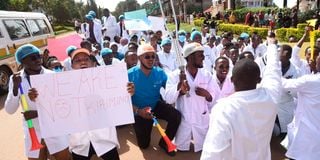‘We won't beg!’ Doctors vow as national strike cripples services

Doctors demonstrate in Eldoret town, Uasin Gishu County on March 01, 2024, over the attack of medics' union Secretary General Dr Devji Atellah.
What you need to know:
- Doctors say the strike will continue and will not engage in mediation talks, despite a court order to stop it.
- On Wednesday, the Employment and Labour Court suspended the doctors' strike.
Doctors' union officials have maintained that the strike will continue and that they will not engage in mediation talks, despite a court order to stop it.
On Wednesday, 13 March the Employment and Labour Court suspended the doctors' strike. Judge Byram Ongaya ordered the cabinet secretaries for Health and Labour to meet with officials of the Kenya Medical Practitioners and Dentists Union to address the issues in the strike notice.
"We are not going to be part of that mediation meeting. Our lawyers will go if need be. We pleaded with them to talk to us before this strike, but it's like we were a bother. We are not relenting. If the strike is the language they understand better, let's speak it," Dr Atellah said.
The order released yesterday states, "Hold a meeting with KMPDU officials to negotiate in good faith the grievances outlined in the strike notice and agree on minimum safety services the union members shall provide in the event the strike goes on."
The meeting is scheduled for today at the Ministry of Labour offices, but the doctors are staying put.
"Doctors are not in hospitals. We will not be intimidated. We are asking the government to allow us to strike in peace. We will not be part of the scheduled mediation meeting. We are not kids to be tossed around," Dr Davji Atellah, the secretary general of the Kenya Medical Practitioners and Dentists Union (KMPDU), said.
According to Dr Atellah, doctors have faced humiliation, intimidation, and frustration from the government for years. The government has been demanding that doctors beg and kneel while asking for their rights.
Dr Atellah added that they have made all necessary preparations to comply with the court's order to provide minimum safety services to Kenyans if the strike occurs.
"How do you call a meeting to define the minimum services and to establish so that our strike is not ineffective but effective? This is already arranged, and that meeting is not for us; let them meet and decide how to pay us," he said.
"We have arranged for doctors to be available on call in case of any emergency situation that may arise. They will not be working but waiting for calls from the comfort of their homes. For a hospital with 300 doctors, one will be just a phone call away to attend to any emergency cases. Please note that we are currently on a full strike," Dr Atellah said.
He said the government has been on strike for the last seven years, and it has made zero promises to doctors and has no implementation plans.
"What will they say in that meeting that we have never discussed with them? When we bring up an issue, it is their egos at play instead of discussing what is pertinent to us,"
The doctors now demand comprehensive medical insurance coverage for the union members as per the human resource policy and procedures manual for Public Service 2016 under the CBA with the Counties.
"Failure to employ doctors in compliance with the set staffing norms and standards for health workers as agreed under Article 4 and perennial delayed posting and payment and general mismanagement of the internship programme as agreed in the CBA with the Ministry of Health has caused the status quo," he said
"We are demanding a refund of the deducted housing levy declared unconstitutional, illegal, null and void, conversion of all doctors within the Counties on discriminatory contractual terms to permanent and pensionable terms and conversion of the employment terms of the 113 medical officers hired by Nairobi City County under discriminatory contractual terms to permanent and pensionable terms," says Dr Miskellah.
The doctors are urging the government to increase its annual budget allocation to healthcare to 15 per cent. They believe this will address the issues caused by inadequate resource allocation, misplaced priorities, reliance on donor funding, and corruption.
"In 2001, African leaders met in Abuja and committed to dedicating 15 per cent of their national budgets to healthcare delivery. As of 2021, only South Africa and Cape Verde had kept this promise. Even more significant concern is how Kenya has progressively reduced its allocation to the Health docket. The latest is Sh141 billion out of a 3.79 trillion budget (3.7 per cent). The highest allocation ever was seven per cent.
The government has maintained that it needs more than the Sh 4.9 billion required to hire and post medical interns.
"They (medical interns) have not been posted because they want a salary, which I don't have. I need Sh4.9 billion to post them all, and I don't have that money. If the Treasury gives me money, then I will post them. If the Treasury does not give me money, then I will have to change the law so that they can be affordable. Otherwise, for now, they are not affordable," Health Cabinet Secretary Susan Nakhumicha said at a function in Narok.
According to the KMPU data, 1,210 medical interns have yet to be posted, despite the internship policy stating that they should be posted 30 days after graduation.
They include 849 medical officer interns (those with Bachelor's degrees in medicine and surgery), 72 dental officer interns (those with Bachelor's degrees in dental surgery) and 289 pharmacist interns (those with Bachelor's degrees in pharmacy).



